The Lilith Blog
January 8, 2020 by Yona Zeldis McDonough
The Power of Humor for Smashing the Patriarchy
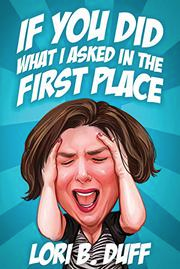 Most attorneys don’t moonlight as a humorists, so Lori B. Duff’s new collection of essays, If You Did What I Asked in the First Place (Deeds Publishing), may just be a first of its kind. Duff talks to Fiction Editor Yona Zeldis McDonough about her unusual professional pairing.
Most attorneys don’t moonlight as a humorists, so Lori B. Duff’s new collection of essays, If You Did What I Asked in the First Place (Deeds Publishing), may just be a first of its kind. Duff talks to Fiction Editor Yona Zeldis McDonough about her unusual professional pairing.
YZM: How do the jobs of lawyer and comic coexist in your life?
LBD: I feel sorry for lawyers without a sense of humor. I feel like those two things are the Yin and Yang of my life. They balance each other out. The law can be so harsh. No one thinks, “I’m having the best day of my life. I think I’m going to go see my lawyer.” People come to talk to me professionally when they are at their lowest: when someone has died, when their marriages are breaking apart, or when they are in financial trouble. When you focus on those things for 40 or more hours a day, you start thinking the entire world is tragedy. It’s important to balance that by thinking about the opposite of tragedy, which is comedy. When you add to that the maxim that comedy is tragedy plus time, they are natural partners. (more…)
- No Comments
January 7, 2020 by Eleanor J. Bader
How Women Can Get Over Our Fear of Asking for Money
“People will go to jail for things they believe in, but they’re often afraid to ask someone for money,” Marjorie Fine says. This is why she travels the country, teaching grassroots, social justice activists the ins-and-outs of raising money from both foundations and individual donors. For women in particular, asking for money and raising it can provide unique challenges, making Fine’s expertise particularly useful.
Fine learned her craft as a development staffer at a host of organizations: The National Council of Jewish Women, The North Star Fund, the Unitarian Universalist Veatch Program at Shelter Rock, The Center for Community Change, and the now-defunct Reproductive Rights National Network.
- No Comments
January 7, 2020 by Arielle Silver-Willner
The Fake Abortion Clinics That Mislead Patients
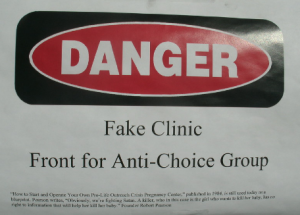
You’re well aware of the dire state of reproductive justice in the United States. You know that recent legislative moves such as the so-called “Heartbeat Bills” and the reduction of funding for Planned Parenthood severely threaten the lives of all folks capable of pregnancy or experiencing health conditions that affect the female reproductive system.
But there’s another threat to reproductive justice which works in tandem with these laws. Because even as abortion access gets choked by a million restrictions, Crisis Pregnancy Centers proliferate.
CPCs, also known as “fake abortion clinics” or, euphemistically, “Pregnancy Resource Centers” are essentially anti-choice hubs of misinformation. Often located in close proximity to an abortion-providing women’s health center such as Planned Parenthood, they aim to reach pregnant, option-seeking people before they make the choice to terminate. Many are religiously affiliated. However, as nonprofit organizations, they are also eligible to receive Title X funding.
In New York City, CPCs must adhere to legal guidelines intended to ensure that visitors are aware that they are not entering an abortion clinic, or even a medical center. New York City Local Law 17 requires these offices to display disclosure statements in both English and Spanish, advising visitors that they do not employ licensed medical professionals, and thus conveying that they will be receiving social services, but not medical services. However, Centers outside of NYC are entirely unregulated, as they are not technically medical centers or businesses. Even so, they can and do interfere with the health of their “patients.”
- 1 Comment
January 6, 2020 by admin
How Singing (Yes, Singing!) Can Create Radical Jewish Accessibility
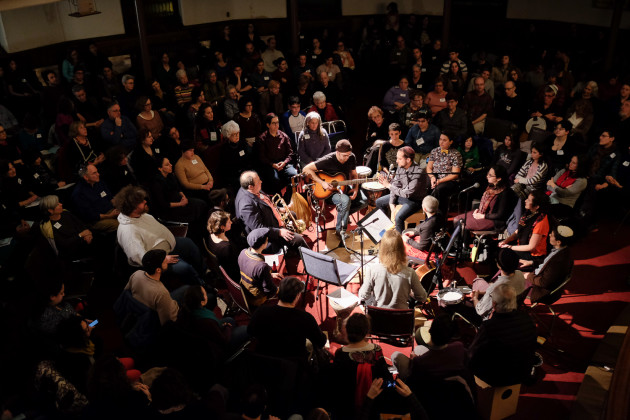 There’s a Hasidic story about a man who lived in Poland, renowned across the country for the fervor of his prayers. So stirring was his reputation that the Baal Shem Tov decided one day to travel great lengths to see this spiritual power for himself. After making a long journey, he found a shepherd boy standing on a hilltop, holding a prayerbook and calling out letters one by one. “Bet! Reish! Vav!” he cried out, on and on, and then, “Master of the Universe, this is all I can do. You know how the prayers should be pronounced. Please, arrange the letters in the proper way.”
There’s a Hasidic story about a man who lived in Poland, renowned across the country for the fervor of his prayers. So stirring was his reputation that the Baal Shem Tov decided one day to travel great lengths to see this spiritual power for himself. After making a long journey, he found a shepherd boy standing on a hilltop, holding a prayerbook and calling out letters one by one. “Bet! Reish! Vav!” he cried out, on and on, and then, “Master of the Universe, this is all I can do. You know how the prayers should be pronounced. Please, arrange the letters in the proper way.”
When I first heard this story, I recognized myself in it, and countless people I know: those of us for whom Jewish education and Jewish life has not always been accessible. Those of us filled with a hunger to express ourselves, to cry out in prayer, and to contribute, who didn’t start out knowing how to piece the letters together —metaphorically or literally. I’ve devoted my adult life and my rabbinate to creating spaces where people like me, like this fabled shepherd boy, can access Jewish tradition and thrive. Because, as this story reminds us, brilliance and creativity aren’t dependent on literacy. God receives us as we are, judging not our level of knowledge but rather the depths of our hearts. And as it turns out, one key to finding that space is through music.
- 1 Comment
December 31, 2019 by admin
Can We Cut Off Antisemitism at its Roots?
 On the antisemitic attack in Monsey:
On the antisemitic attack in Monsey:
Last night I had a dream that it was finally time to harvest the root vegetables. In the dream, they had been left too long in the ground, and they were starting to rot.
I woke up, dressed, and went outside to harvest. I wasn’t too late. The first radish, round and bright and pink, allayed my fears. I spent the morning digging up the roots, rinsing them clean, putting them into containers to store. Then I checked the news.
Hasidic Jews in New York attacked with a machete inside their Rabbi’s home on Chanukah. The ninth antisemitic attack in New York during this week. Visibly Jewish people bearing the violent brunt of the story told about all Jews: that we are the ultimate source of people’s suffering. And that by harming us, killing us, that suffering will be alleviated.
- 2 Comments
December 31, 2019 by admin
On Christmas, and Confusion
Passing. There’s no time like the holidays for it. Passing plates. Passing on obligations and invitations. Passing by the Salvation Army jingles and tourists gawking at Macy’s holiday window displays. And passing by all the trees, wrapped up and dreaming of living rooms.
Suddenly, nothing is secular, so everything is secular. I usually don’t listen to music through headphones—music was made for orchestras and turntables and studios and theaters and speakers. But in December, I do. It’s cold, it’s lonely, and there’s a whole catalogue of carols written to address the temperature and the accompanying existential squall. And all the best songs were written by Jews, of course. So, I put in my headphones and join my ancestors and pass.
When I was in fifth grade, I wrote a report about Irving Berlin. I chose him randomly—I browsed the biography shelves after my immigrant parents, who had waited to get the internet until it became necessary, dropped me off at the library. I remember opening a book and seeing a menorah on the first page and reading something about his Russian roots. Perfect, I thought. He’s just like my dad, this’ll be easy. White Christmas meant nothing to me at the time—I didn’t see it until this year and only because I’ve been consumed by religious inversions recently.
Hanukkah wouldn’t exist without Christmas. It’s been plucked out of scriptural obscurity and magnified to give Jews something to do. Or rather, something to buy, should we not succumb to the cheerful Christmas monolith. I don’t mean to deride the monolith—I mean to define it. I mean to trace its edges and describe its shape in a way that only certain kinds of outsiders can. Jews occupy a particular intersectional niche: we are frequently able to pass and comment both from the inside and the outside on what we see.
- No Comments
December 27, 2019 by Eleanor J. Bader
After Loss, a Devotion to Those Afflicted by AIDS
Not long after nurse and public health activist Elena Schwolsky’s husband, Clarence Fitch, died of AIDS in 1990, she left her job at a Newark, New Jersey, pediatric AIDS clinic, enrolled in graduate school, and went to Cuba to study the island’s AIDS treatment protocols and meet people living with the virus. The result of her six-month stay is the recently released Waking in Havana: A Memoir of AIDS and Healing in Cuba (She Writes Press).
Both deeply personal and deeply political, the book is a reflection on the challenges of living with HIV/AIDS and what it means to deliver humane medical care. The impact of the US embargo on Cuba and the collapse of the Soviet Union are part of the story, but Schwolsky’s focus never wavers from the individuals who are working to eradicate the disease. Likewise, people living with the virus are front-and-center in her moving, and often surprising, account.
Schwolsky sat down with Eleanor J. Bader in mid-December to discuss Waking in Havana, her ongoing AIDS work in Cuba, and the pervasive and persistent misconceptions about the island that continue to be promulgated.
Eleanor J. Bader: After working in a pediatric AIDS clinic and losing your husband to the virus, what made you want to do a deep dive into Cuba’s AIDS crisis?
Elena Schwolsky: I did ask myself if I really wanted to put myself in a Cuban sanitorium, where every resident had the virus and would likely get sicker and sicker. But Clarence had been on the frontlines and it somehow felt comforting to share in this work. It seemed like an important battle. I also think that I had survivor’s guilt. The universe had given me a pass and I felt committed to using my life in a way that had meaning. It gave me an identity, and the camaraderie in the AIDS service community had an urgency that bound us together. Plus, I was curious and wanted to see how the epidemic was handled in a different place.
- No Comments
December 26, 2019 by Yona Zeldis McDonough
A Jewish Girl’s Summer Among New England WASPs
It’s 1987 and Eve Rosen, a young aspiring editor, abruptly leaves her lackluster job in New York City and decamps to Cape Cod. Once there she becomes the assistant to a well-regarded older male writer and is ushered into the kind of heady literary life she’s only been able to dream about. Author Karen Dukess talks to Fiction Editor Yona Zeldis McDonough about The Last Book Party (Henry Holt), her witty and tender debut novel.
YZM: Does Eve feel intimidated by the largely non-Jewish crowd she finds herself in with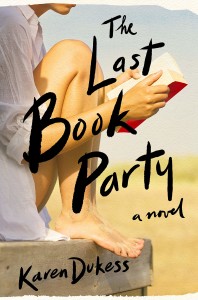 that summer?
that summer?
KD: Eve is definitely intimidated by this crowd, but the aspect of their difference from her own background that most unsettles her – and also attracts her – is not that they are not Jewish, but that they are writers and artists. Eve believes that if she had been born into a literary world instead of the conventional, upper-middle class, professional world of her family, her path to becoming a writer would be smoother. She’s comfortable with people like her parents who read The New Yorker (or just subscribe and let it pile up) but she is intimidated by people who write for The New Yorker. Everything about this crowd is “other” to Eve – they are accomplished, sophisticated and worldly in a way that Eve yearns to be. That they are mostly WASPy is just one more factor of difference.
- No Comments
December 19, 2019 by Aileen Jacobson
Maiden, Sorceress and Stepmother on Stage, Yiddish-Style
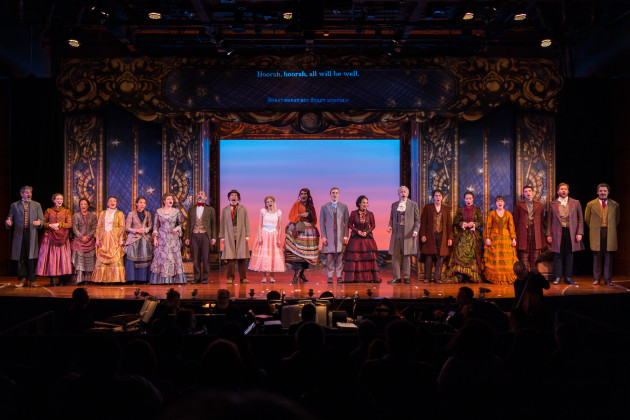
Image courtesy of National Yiddish Theatre Folksbiene
I was a little skeptical when I learned that the National Yiddish Theater Folksbiene—the company that brought us the excellent Yiddish “Fiddler on the Roof” and “Hannah Senesh”—was going to present “The Sorceress,” an operetta that was the first formal Yiddish theatrical production in America. Written in 1878 by Avrom Goldfaden, it centers on an innocent young woman suffering at the hands of a devious stepmother and her cohorts, led by the evil title character, traditionally played by a man, as it is here.
I suspected it would not be feminist. But, I thought, maybe the director and others who restored the play (a massive effort) and created this version find ways to make demeaning stereotypes more palatable for modern audiences.
Or did the play (“Di Kishemakherin” in Yiddish) actually already depict strong Jewish women in a powerful and provocative way? Was it feminist in 1878 and is it feminist in 2019?
- No Comments
December 18, 2019 by Helene Meyers
7 Jewish Feminist Highlights of 2019
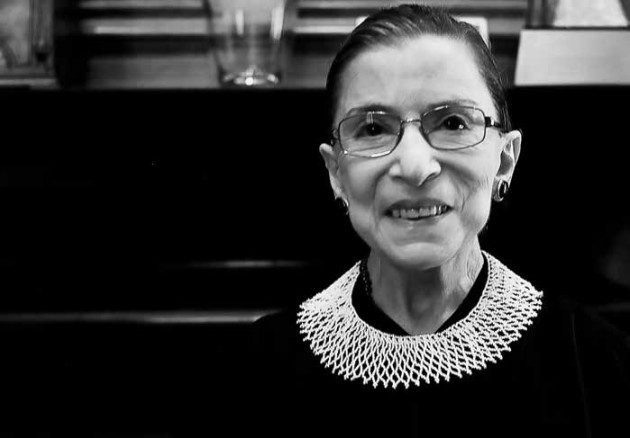
(Photo by Joan Roth) Ruth Bader Ginsburg
Between impeachment hearings, an overstocked Democratic presidential field, intensifying attacks on abortion rights, continued governmental atrocities against immigrants, and hate crimes against Jews and Jewish institutions, 2019 has been quite the year (and that’s understatement!). But as Deborah Lipstadt wisely counsels in her book Antisemitism: Here and Now, we need “to balance the ‘oy’ with the ‘joy.’” In that spirit, I offer my annual seven Jewish Feminist Highlights (seven being the number associated with creation and blessing in the Jewish tradition).
- No Comments
 Please wait...
Please wait...